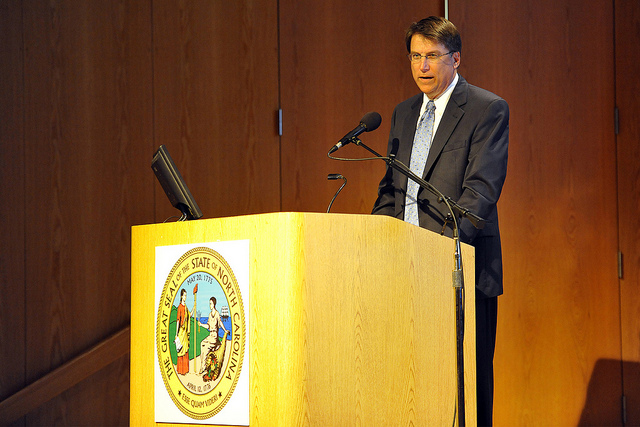
March 20, 2017; Salon
Former North Carolina governor Pat McCrory says he is having a hard time finding a new job. McCrory, as readers may remember, was governor when House Bill 2 (more popularly known as the “bathroom bill”) was passed. He has since been voted out of office, and he says that the reputation of “bigot” has made him career-challenged in these days of greater attention to inclusion—although that is not exactly how he put it.
Even after I left office, people are reluctant to hire me because, “oh my gosh, he’s a bigot,” which is the last thing I am. I’m actually in some ways rather liberal on some of these issues. I’m a libertarian on many of these issues. But I don’t think a city government or state government or federal government should be able to tell the private sector what the new definition of gender is.
“If you disagree with the politically correct thought police on this new definition of gender…you’re the worst of evil,” McCrory said. “It’s almost as if I broke a law.”
Maybe not a law, but certainly an emerging standard that can seriously affect the bottom line.
McCrory blames the Human Rights Campaign for his defeat in his campaign for reelection, calling the group “more powerful than the NRA.” This is only one of a number of statements the former governor made that we sincerely hope are true.
“I said that nine months ago and everyone laughed,” McCrory said, “and now everyone’s going, ‘You know, maybe they are,’ because they put their pressure on corporations. The NRA puts pressure on politicians. The HRC puts public pressure, threatened boycotts on major corporations through the U.S. with a false narrative, and it worked.”
Nico Lang writes for Salon:
Sign up for our free newsletters
Subscribe to NPQ's newsletters to have our top stories delivered directly to your inbox.
By signing up, you agree to our privacy policy and terms of use, and to receive messages from NPQ and our partners.
The reason that no one wants to hire McCrory, though, has nothing to do with the tyranny of left-wing ideologues. Businesses who have spent the past few decades making a name for themselves as leaders in corporate equality are unlikely to jeopardize their reputation by hiring someone whose public record is opposed to fostering an atmosphere of diversity and inclusion. If the economic fallout over HB2 was proof positive that anti-LGBT discrimination is bad for business, McCrory is finding out the hard way that bigotry is also bad for your career.
Lang writes that things have changed since the Human Rights Campaign’s Corporate Equality Index first launched in 2002. The landscape for LGBT rights was completely different: Only 13 corporations boasted perfect scores when it came to LGBT inclusion, compared to 15 times that number now. That may have something to do with the fact that the global buying power of the LGBT community is estimated at $1.8 trillion and that “queer and transgender people tend to support companies that support them.” And, conversely, they do not do business with corporations that indicate they may not be supportive.
“What businesses have found—well ahead of lawmakers and the courts—is that being an LGBT-inclusive employer is crucial when it comes to attracting and retaining talent and when it comes to appealing to the ever-growing lucrative LGBT consumer market,” said Deena Fidas, Director of the Workplace Equality Program at HRC. “It’s just part of doing business.”
In 2013, advocacy groups like HRC and GLAAD called for a boycott of Barilla after its CEO, Guido Barilla, claimed that the popular pasta brand would not be featuring same-sex families in its advertisements, as the company supports a “classic family where the woman has a fundamental role.” The backlash was effective enough that Fidas said executives “totally [transformed] the company with regards to their policies, their benefits, and their internal practices on LGBT inclusion.” By 2014, Barilla became one of those perfect-scoring companies atop the Corporate Equality Index.
Over the past five years, businesses and governments all over the United States have felt the very real financial consequences of discriminating against LGBT persons. McCrory’s former gig does not speak well to his understanding of this very serious new environment. North Carolina has lost up to $201 million in tourism and tax revenue. He is a poster child for exclusion, and that is indeed likely to limit him in his future career if we continue to grow increasingly inclusive as a society.
McCrory caps the whole thing off with this musing:
I get all these people coming up to me and going, “Hey, governor, I agree with you on this issue, we’re behind you.” They were whispering. And this is one fault I have of the silent majority: The silent majority’s too silent! And they let the loud minority actually speak and win the election. So I’m starting to wonder—maybe the silent majority’s no longer the majority anymore.
Right.—Ruth McCambridge













